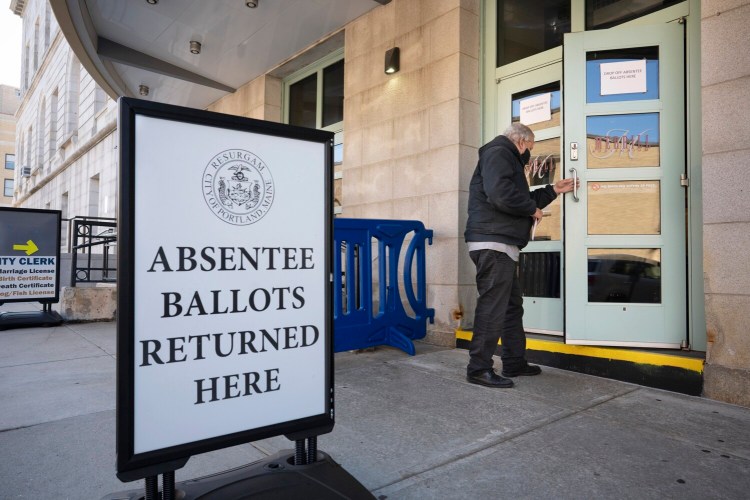From ballot drop boxes to an online ballot tracking service, temporary measures used to reduce the spread of COVID-19 during the November election would be made permanent under a series of bills backed by Maine’s top election official.
Secretary of State Shenna Bellows, a Democrat, told the Legislature’s Veterans and Legal Affairs Committee Wednesday that the bills aim to make voting easier, safer and more secure.
“Everyone should have the freedom to vote equally, to ensure that our elections truly reflect the will of the people – that’s what these bills are about,” Bellows said.
Maine voters used absentee ballots in record-shattering numbers in November, and the state ranked third in the U.S. for voter participation, with 75 percent of eligible voters casting ballots in the presidential election, Bellows said. Sixty-two percent used an absentee ballot, returning them in person, by mail or depositing them in ballot drop boxes.
The online absentee ballot tracking system Maine rolled out in September should also stay in place, as it boosted voter confidence and added transparency, Bellows said. The system allowed voters to follow the progress and location of their ballots from the time they requested them until they were returned to local election officials.
“We should be really proud that these proposals seek to expand voter participation and strengthen our election laws to protect the freedom to vote for all Mainers,” Bellows said.
The Maine Legislature, like those in most states, is handling dozens of bills aimed at election reform following an election cycle highlighted by the pandemic and false claims of election fraud by former Republican President Donald Trump and others. Republican legislation has generally tried to tighten voter access through photo-identification requirements and other means, while Democratic measures largely attempt to increase access by making it easier for eligible voters to register and cast ballots.
Last week, the Veterans and Legal Affairs Committee, in a series of party-line votes, rejected bills that would require voters to produce photo identification.
Voting-rights advocates offered broad support for the bills aired at Wednesday’s public hearing, but a handful of provisions drew opposition, including from the Maine Town and City Clerks Association. Municipal clerks in Maine oversee elections in more than 500 cities and towns.
Patti Dubois, representing the clerks’ association, said it opposes a provision in one bill that would allow municipalities to have multiple ballot drop boxes.
“Many municipal clerks could be politically pressured to install drop boxes in certain wards or districts or neighborhoods or on college campuses. Each municipality should be limited to one drop box,” Dubois said.
The clerks supported another bill that would limit drop boxes to one per town.
Dubois said clerks also oppose a bill that would extend the deadline for requesting an absentee ballot to 5 p.m. the day before an election. Currently, voters can request one in person until the Thursday before an election. Dubois said clerks need the Friday and Monday before Election Day to prepare, and to begin processing absentee ballots.
“When we compare absentee voting across the country, we have robust absentee voting laws and we are trying to figure out what problems this bill is trying to solve,” Dubois said. “It would slightly increase convenience to the voter but it would significantly impact the ability of municipal clerks, which are the election experts in the state, to effectively staff, organize and manage the entire voting process.”
The committee also took testimony on a bill that would direct Bellows to research changing to an all vote-by-mail system in Maine, including automatically mailing an absentee ballot to every registered voter. Only five other states – Colorado, Hawaii, Oregon, Utah and Washington – have such systems.
That bill drew questions from Rep. Patrick Corey, R-Windham, who said he was concerned that outdated voter registration lists could result in ballots being mailed to people who no longer live and vote in Maine.
“I don’t know how we can support a bill that’s in favor of sending ballots to voters that aren’t here, that don’t live in Maine any longer,” Patrick said.
Deputy Secretary of State Joann Batista, who testified for the study bill, said it would allow Maine to research other vote-by-mail states to see if Maine should implement a similar system. “To figure out if it would make sense to do the same thing here in Maine,” Batista said.
The committee will next hold work sessions to amend or change the bills before voting on whether to recommend passage by the full Legislature later this year.
Copy the Story LinkSend questions/comments to the editors.




Success. Please wait for the page to reload. If the page does not reload within 5 seconds, please refresh the page.
Enter your email and password to access comments.
Hi, to comment on stories you must . This profile is in addition to your subscription and website login.
Already have a commenting profile? .
Invalid username/password.
Please check your email to confirm and complete your registration.
Only subscribers are eligible to post comments. Please subscribe or login first for digital access. Here’s why.
Use the form below to reset your password. When you've submitted your account email, we will send an email with a reset code.